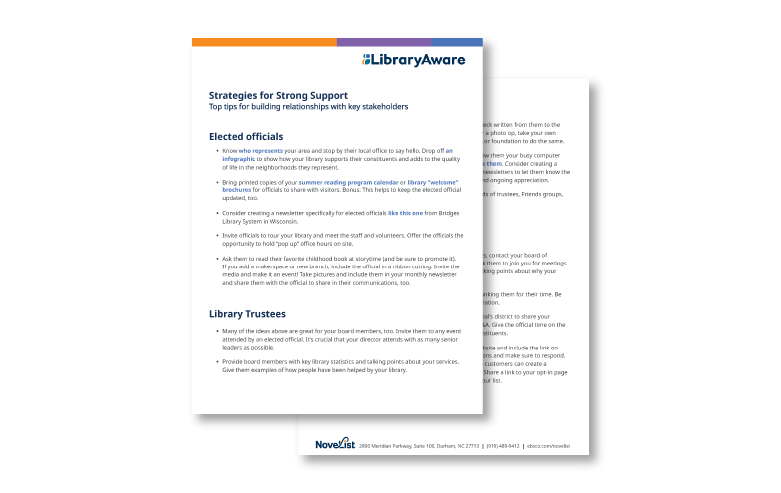Hindsight is 20/20. That axiom rang true (again) when I read an apology in a library’s newsletter for proposing steep budget cuts to their board, including the closing of several locations, without community input. Patrons and other stakeholders found out about the cuts when they saw media reports. They were understandably upset. According to the library, their falling short on communicating the seriousness of the situation resulted in many assumptions and inaccurate information. They pledged to do better moving forward.
The results this library experienced are sadly all too common. I really felt for this library. I know they didn’t intend for this outcome. It’s a terrible spot to be in, yet, in most cases, it’s avoidable.
It is vitally important to include your community in important communications and lay a groundwork of support among your board and elected officials before you need it. It will take so much more of your library’s time to rebuild trust than to invest the time upfront in building a strong relationship with your community and key stakeholders.
As someone who has spent her career helping elected officials, major organizations, and a large library system communicate more effectively, I felt compelled to share some of what I’ve learned to help libraries navigate these situations. Libraries are their own best advocates, but through relationship-building and good communication, others will be advocates, too.
Here’s how to get started:
Conduct a risk assessment
This is a crucial first step. In a risk assessment, you identify worst-case scenarios or the issues or situations that could cast your library, senior leadership, or board members in a negative light. For example, what would you do if your library was facing a book ban or major budget cuts? What if someone was found to have misused funds or broke the law? How would you respond to negative and possibly damaging comments online or from the media? What policies and procedures should be put in place? This worst-case scenario preparation is the risk assessment work public relations and marketing professionals do as a matter of course, and you should too.
Share your library’s value all year long
Celebrations like Library Card Sign-up Month in the U.S., National Library Month in Canada, Library and Information Week in Australia, and New Zealand Library Week are great times to promote the value of your library. Just don’t make it the only time. Messages must be heard repeatedly to stick. Year-round visibility is key to effective advocacy.
Remember your manners during times of support
We all learned to say please and thank you for good reason. It’s not only the polite thing to do, it’s also strategic. Today’s thank you will go a long way toward tomorrow’s request. Regardless of whether the vote went your way, thank your supporters through an e-blast, social media post, or webpage. Here’s a great example of acknowledgment on a webpage from Bethlehem Public Library in New York.
Sow seeds of support before you need it
Strong, established relationships with people who will advocate for your library will be critical when times get tough. Library trustees, Friends groups, foundations, donors, and elected officials often have deep community connections or influence. When my library faced devastating budget cuts, we were able to ask supporters on the city council, our Friends group and foundation, and community leaders to speak out on our behalf. They readily said yes because we had taken the time to build those relationships before we needed them.
Building a base of strong support throughout your community before you need it will pay dividends when you do. Need more ideas for building relationships with elected officials and other key stakeholders? Download this handout and get started today.

Download the Strategies for Strong Support handout here.
Kathy Lussier is Director of Library Engagement, Marketing, and Professional Development for NoveList. She is currently listening to You Are Here by David Nicholls.



